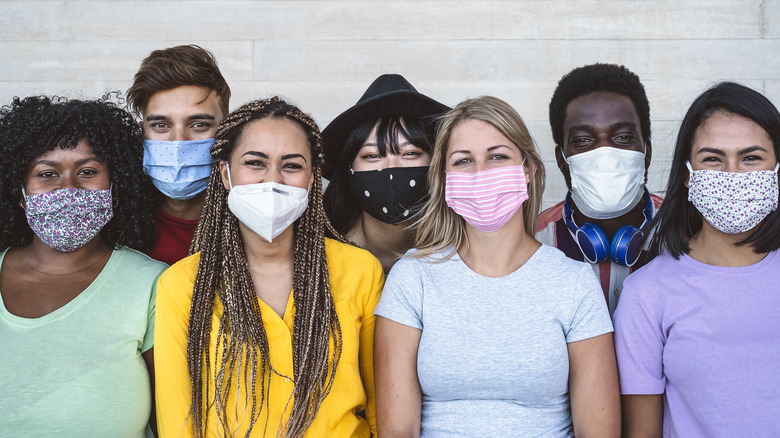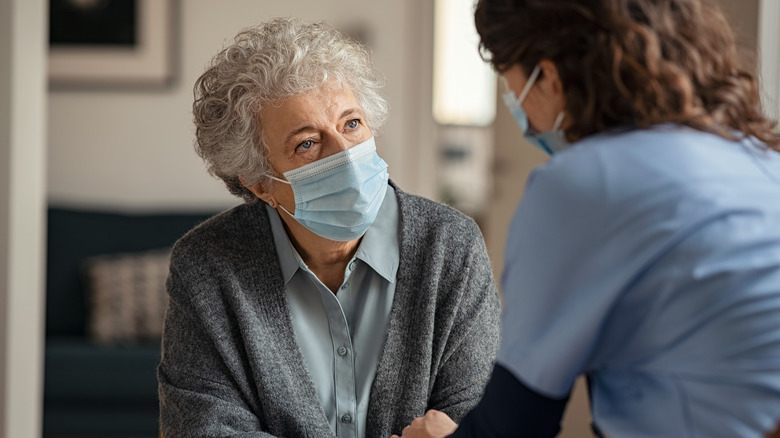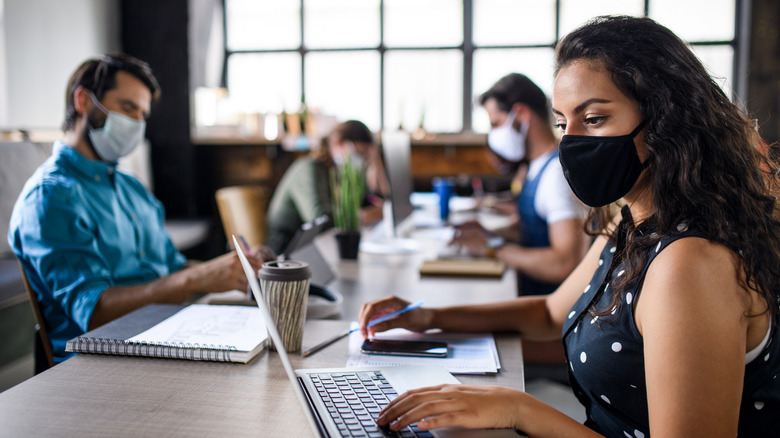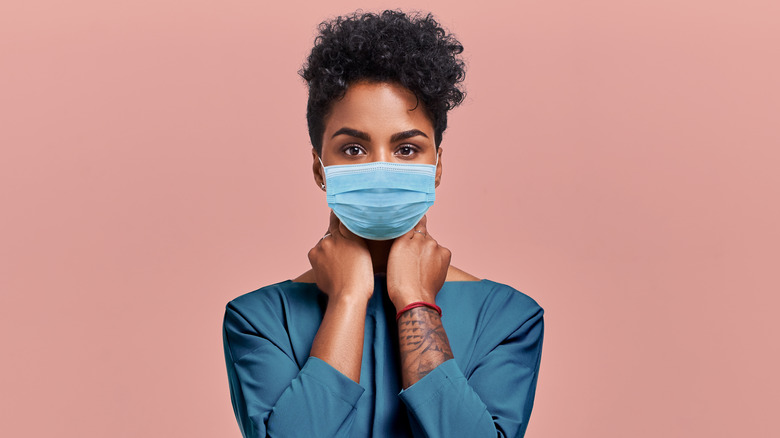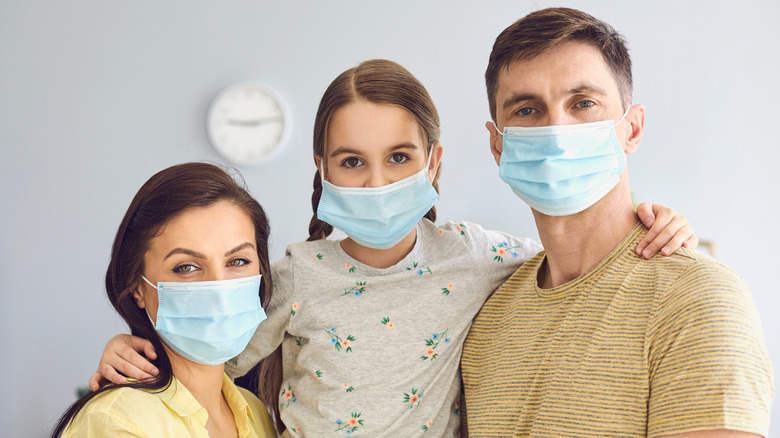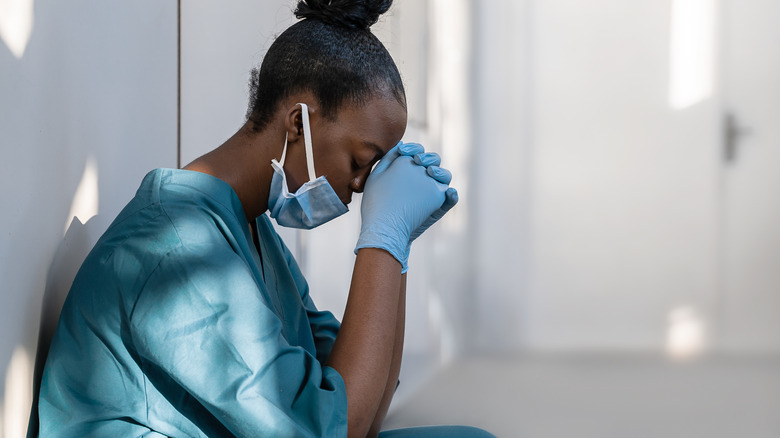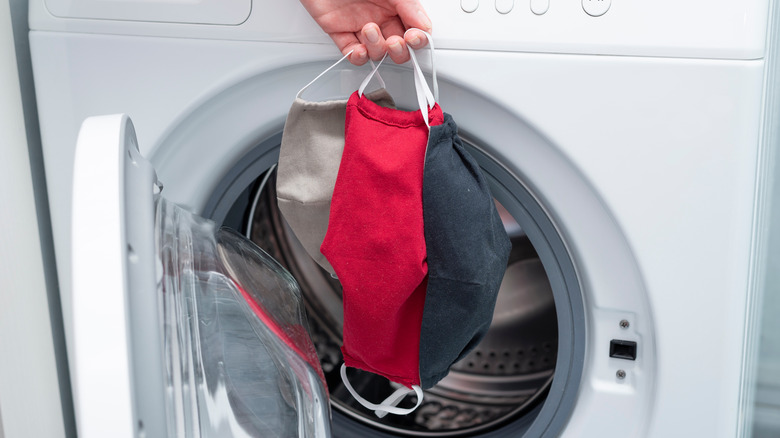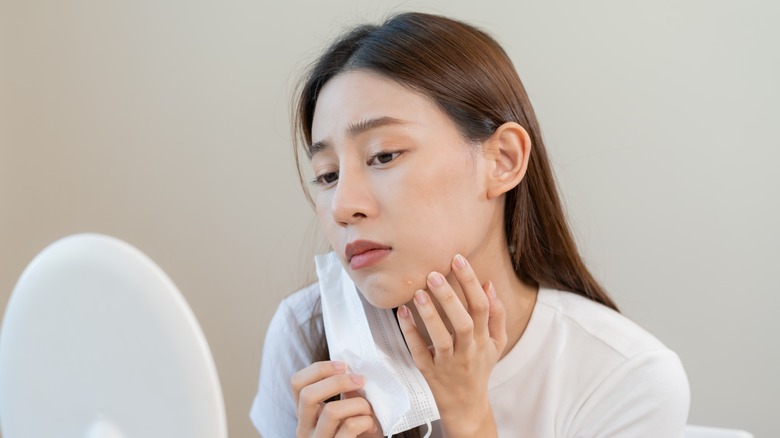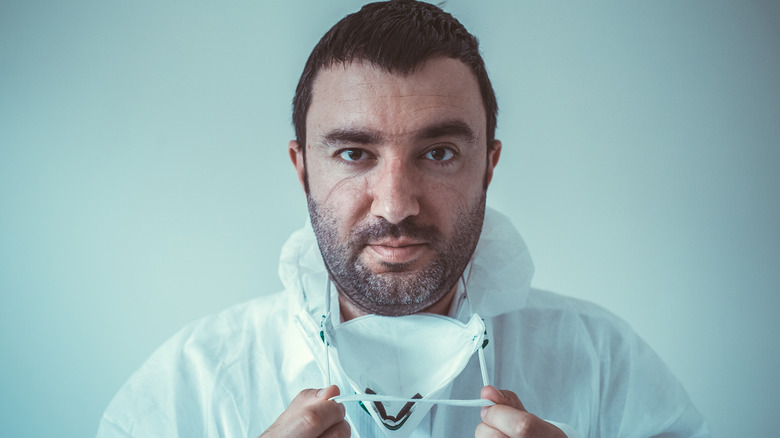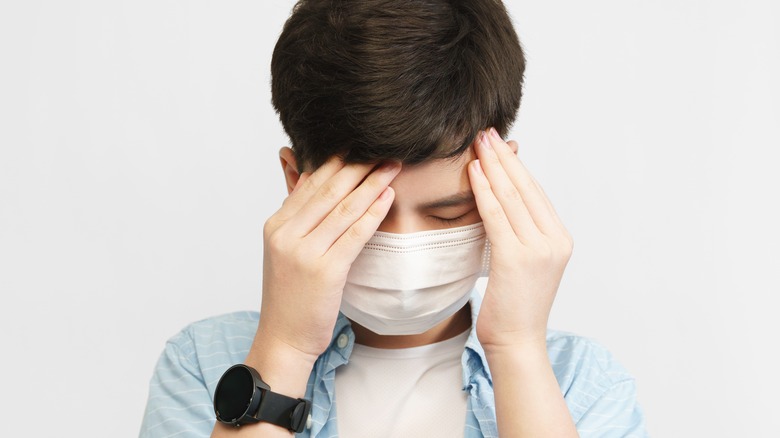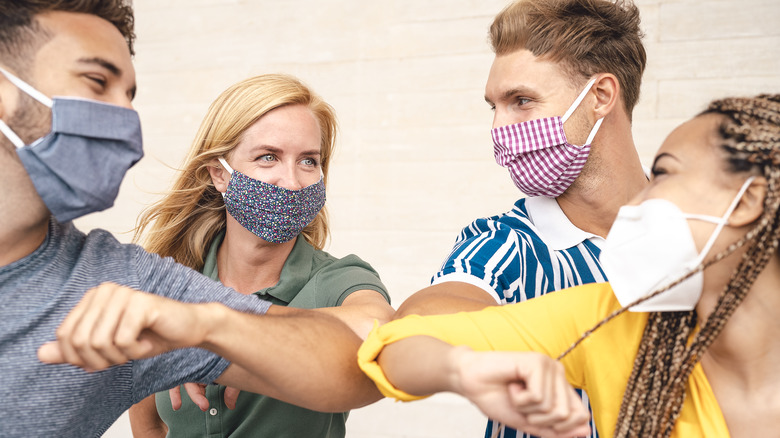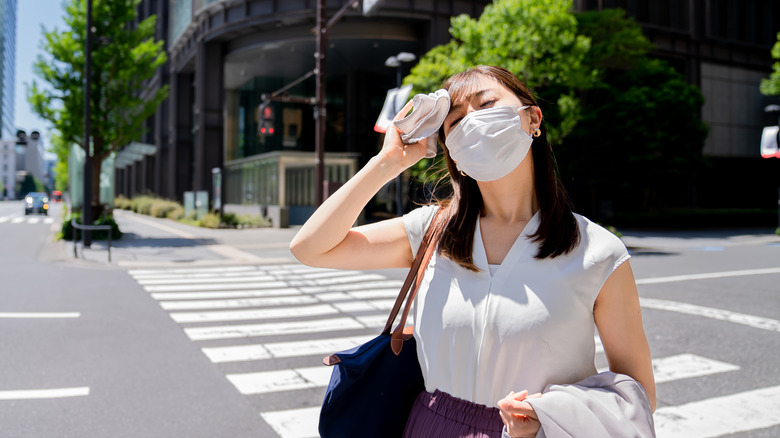What Happens To Your Body When You Wear A Face Mask All Day
There's no doubt about it — medical face masks have become a common accessory in our modern society. While health experts agree that wearing a face mask helps reduce the spread of COVID-19 (via UCSF), they can still be pretty darn uncomfortable, especially if you have to wear one all day. Sometimes they don't fit right, they can fog up your glasses, or they don't match your outfit. In fact, a national survey by market researcher Premise reports discomfort as the number one reason folks don't wear a mask. There are also some interesting stories circling the internet about how masks can have negative side-effects, like the guy who claimed he got in a car accident after passing out from wearing a N95 mask for too long (via Health).
The Centers for Disease Control and Prevention (CDC) recommends wearing a mask in public if COVID-19 community levels are high in your area — however, the guidelines continue to change and it's best to keep checking the CDC website to stay up-to-date on current recommendations. Let's explore some of the things that can happen when you wear a face mask all day, both beneficial and not-so-much, and tips and tricks for how to make a face mask less awkward and more comfortable.
It helps protect others from COVID-19
COVID-19 is transmitted through respiratory particles from an infected individual (via CDC). This means anytime someone who has COVID-19 talks, sneezes, coughs, laughs, or even breathes, they are releasing virus particles into the air, and those in the surrounding area are at risk of infection if they inhale them. Masks help reduce the amount of respiratory droplets that are released into the air from someone who has COVID-19, thereby reducing the risk of infection for those around them. Indeed, one research study published in Health Affairs found that over the course of about a month from April to May 2020, the daily COVID-19 cases were notably lower in U.S. states that had mask mandates compared to U.S. states that did not.
There has been a lot of controversy around the effectiveness of cloth masks, and whether a surgical or N95 mask is more effective. According to Dr. Peter Chin-Hong, an infectious disease specialist, "The best mask is one you can wear comfortably and consistently" (via UCSF). Most scientific researchers agree that any mask is going to be more effective than no mask at all — for instance, at least one research review that provides evidence that the use of non-medical masks, like cloth masks, helps reduce the transmission of the corona virus. That said, more recent data has shown that respirator masks are almost 50% more protective than cloth masks (via Forbes).
It helps protect you from COVID-19
According to the CDC, masks do help protect the person wearing the mask from getting infected with COVID-19. The face mask acts like a filter, and can reduce the number of virus droplets inhaled by the mask-wearer. In general, multiple-layered masks like surgical and respirator masks are more effective than single layer ones. Making sure that your mask is fitted properly also increases its ability to protect you from COVID.
According to one scientific study, wearing a face mask in indoor public environments reduces your risk of getting COVID-19, with respirators like KN95 coming out as the top preventative masks. The study found that those who wore respirators indoors were 83% less likely to get COVID, while surgical masks decreased the risk by 66%, and cloth masks reduced risk of infection by 56%.
But what about if you're the only one wearing a mask? While it is true that masks are more effective if everyone is wearing them, it is still beneficial for you to wear one if no one else around you is. If you plan on wearing a face mask for your own protection, health experts suggest you choose one of the respirators like an N95, KN95, or KF94 (via The New York Times).
It might feel hard to breathe
Many people say they feel uncomfortable and out of breath while wearing a mask, but don't worry — masks do not affect oxygen levels in the body (via Discover Magazine). According to Christopher Ewing, a lung specialist who spoke to Discover Magazine, these feelings may have more to do with our perception of discomfort when wearing a mask: If a mask is making you feel uncomfortable, it can actually impact the way you breathe, sometimes on a subconscious level. This can result in irregular breathing patterns, like breathing slower or faster than you normally would, which can make you feel short of breath or even dizzy.
So what can we do about it? Being mindful of our breathing is the first step. Breathing usually happens without us having to think about it, but by focusing on your breath, you can have more control and regulate your breathing pattern. Breathing exercises can be a helpful tool. One technique called "box breathing" involves you visualizing a box in your mind, then tracing the edges of the box while inhaling to a count of 4, then exhaling to a count of 4. Repeat this process for several minutes. Or you can try "diaphragmatic breathing". Usually, when you're feeling stressed or like you can't breathe, our body automatically resorts to shallow breathing. "Diaphragmatic breathing" encourages deeper breaths, which can help stabilize your heart rate and lower your blood pressure.
You won't inhale too much carbon dioxide
Many people worry that masks sequester the carbon dioxide that they exhale, causing them to inhale it over and over again, which can be dangerous (via Health). While it is true that inhaling high amounts of carbon dioxide can cause serious health issues — like headache, vertigo, double vision, inability to concentrate, seizures, or more — it must be in very high concentrations to be life-threatening. It is not possible to inhale enough carbon dioxide to cause dangerous side-effects while wearing any type of mask (via Cleveland Clinic). According to Dr. Kelli Randell, an internist and medical advisor for Aeroflow Healthcare, there is no evidence of carbon dioxide toxicity in healthy people who wear any type of mask for a long period of time, even respirators like a N95 (via Health).
Infectious disease expert Dr. Amesh A. Adalja did tell Health that "someone wearing an N95 mask for a prolonged period of time may have alterations in their blood chemistry that could lead to changes in level of consciousness if severe," but this is mostly a cause of concern for those with underlying health conditions, like smokers, or those who are obese, or people who have chronic obstructive pulmonary disease or emphysema (via Health). If you're concerned, wearing a cloth mask that doesn't fit tightly to your face is your best bet, though keep in mind that cloth masks are less protective against COVID.
You might experience increased anxiety
Wearing a mask can disrupt your breathing patterns, causing labored breath or a feeling like you can't breathe (via Discover Magazine). In turn, this can lead to feelings of stress and anxiety, or even a panic attack (via Health). Symptoms may include things like an increased heart rate, breathlessness, or tightness in the chest. If you are prone to anxiety or claustrophobia, wearing a mask may increase the likelihood of these symptoms (via Cleveland Clinic). You may also be more prone to anxious feelings if you're unaccustomed to wearing a mask.
If you suffer from mask anxiety, there are ways to work through it. Things like medication, therapy, and working on shifting your mentality can help, says psychiatrist Dr. Brian Barnett to the Cleveland Clinic. Becoming more accustomed to wearing your mask by practicing at home may also be a good idea. And if you have a favorite aromatherapy scent that calms your mood, try spritzing your mask with it.
A dirty mask can cause a sore throat
A clean cloth mask or a new surgical mask likely won't cause you any issues. However, if you've been wearing the same mask day after day, it's time to throw it in the washing machine, or in the garbage if it's not reusable (via Cleveland Clinic). Over time, a mask can accumulate bacteria and viruses that become stuck inside it — and if you don't wash your mask after every use, or use a clean mask every day, you may be breathing in those irritants. These microorganisms can cause a sore throat, which can be concerning to some people since a sore throat is a symptom of COVID.
Therefore, it's important to always make sure you're wearing a clean mask. Speaking to the Cleveland Clinic, family physician Dr. Neha Vyas advises minimizing the number of times you touch your mask and/or take it off, and making sure your hands are clean before you do so.
You might get maskne
Ah, the dreaded maskne: acne that occurs from prolonged use of a face mask. Masks cause warm air to accumulate when we talk or breathe, and this moist type of environment is the perfect breeding ground for yeast and bacteria, which cause acne (via Cleveland Clinic). Mask-wearing can also cause other skin problems like redness, bumps, irritation, folliculitis, and dermatitis (via Healthline).
Unfortunately, maskne is a pretty common repercussion when wearing a mask. But there are some things you can do to ease the side effects. For one, make sure to wash your face on a daily basis, preferably before putting on a mask and after you take it off. Wearing a clean face mask every time is also a great way to help prevent maskne. If you like to wear makeup, it may be best to just apply it from the mask up — that is to say, only on your eyes and forehead. Makeup can get stuck in your pores, meaning it will take longer for maskne to clear up.
It could cause skin irritation
Masks not only contribute to acne, but can cause other skin irritations as well. According to one survey of 343 healthcare workers, 51% of respondents sustained "skin breakdown" as a side effect of prolonged mask use. Of those, 18.1% experienced it after just one to three hours of wearing a mask and 44% noticed it after three or more hours of mask use. However, it is important to note that 47.8% of those surveyed also said they had a prior history of sensitive skin. The most commonly affected areas, according to the survey, are the bridge of the nose and the cheeks, followed by the chin.
Wearing a mask can also cause other skin problems, like heat rash, which can happen when sweat forms underneath your mask (via Healthline). They can also flare up rosacea, a skin condition that causes redness and sometimes small bumps to form on the face, similar to pimples. If you tend to get skin irritations from mask wearing, using skin emollients and moisturizers can be helpful in lessening the symptoms.
It may cause ear irritation
Another common complaint from mask-wearers is ear pain (via The Washington Post). In a survey of mask-wearing healthcare professionals, 32% of the respondents experienced "skin breakdown" behind their ears from their mask straps. If you struggle from sore ears while wearing a mask or afterward, consider switching up the type of mask you're wearing, or trying to improve the fit. Maybe your mask is too tight, or maybe a different style or brand will fit your ears better. There are also masks that have elastic bands that go behind your head instead of your ears. Some companies are also selling "ear savers" — these are a little piece of fabric, ribbon, or other material that you can tie between your ear straps around the back of your head, thereby pulling the straps away from your ears to help prevent chafing. It's also okay to give your ears a break and remove your mask when you are alone or outdoors and can be safely socially distant.
It may give you a headache
According to one scientific advisory report from Alberta Health Services, mask-wearing may increase headache risk for those with a history of headaches. The report also shared that N95 masks might increase that risk compared to other types of face masks. Indeed, in the previously mentioned survey of healthcare workers who had prolonged use of N95 and surgical masks, the most common side effect was headaches, with a whopping 71.4% of respondents being effected. Of those individuals, 15.2% found their headaches started within one hour of wearing a mask, while 30.6% experienced it after one hour, and 29.7% felt a headache after three or more hours. Interestingly, the majority of those surveyed did not have a previous history of headaches. However, headaches have many causes, and the survey mentions that the healthcare professionals might also experience this symptom due to other factors like neck tension, lack of sleep, abnormal mealtimes, and emotional stress.
It increases the humidity in the air you breathe
Wearing a face mask increases the humidity in the air that you breathe — which is bad news for acne, but actually good news for fighting COVID-19 (via National Institutes of Health). Scientific researchers believe that this highly humid environment helps to hydrate the respiratory system, causing mucus to clear regularly from the lungs, taking with it potentially harmful microorganisms like viruses. They also suggest humidity prompts the body to produce more interferons, a kind of protein that literally interferes with the ability of a virus to replicate within the body. High humidity levels had previously been shown to help reduce the intensity of the flu, and the researchers think that this may also be the case for COVID-19.
The researchers studied four types of masks — an N95 mask, a disposable surgical mask, a two-ply cotton-polyester mask, and a heavy cotton mask — and found that wearing any of these resulted in increased humidity levels.
It's harder to communicate
It's no doubt that face masks can make communication difficult. Sometimes it's simply hard to hear and understand someone with material from a mask blocking the mouth and dampening the sound of their voice (via Nevada Today). Additionally, it's hard to see and interpret nonverbal communication or facial expressions with a mask in the way (Verywell Mind). We often subconsciously rely on things like body language to pick up on emotions and process what is being said. Indeed, what we see when we talk to others seems to be as important as what we hear. But when someone is wearing a mask, the visual aspect of how we interpret communication is disrupted, making conversation a little more difficult.
And what about people who are deaf or hearing impaired and rely on lip reading to communicate? Unfortunately, masks can cause a lot of miscommunication and confusion for these folks. For this reason, some people and organizations have chosen to use clear masks in order to facilitate communication.
The longer you mask, the more likely you are to experience issues
The bottom line: The more time you spend with a mask on, the greater the chances are that you will develop mask-related health issues, according to an Alberta Health Services scientific advisory report. The report reassures us that mask wearing is considered safe, with the risks of prolonged mask use being only minor discomforts and issues. The report also recommends you only wear an N95 mask when you really need to, like on a plane or in super crowded indoor public spaces, because there seems to be more documented issues with long-term use of N95 masks compared to non-medical or cloth masks. It also notes that taking a break from wearing your mask when it can be done safely and ensuring a comfortable fit will help mitigate some potential problems. And don't forget to change your mask out often.

